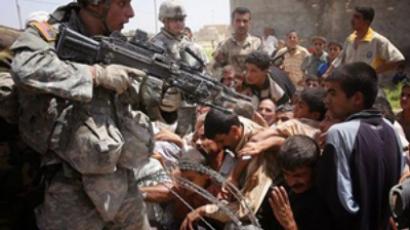Palestinian refugee camps breeding ground for terrorists
Over 200,000 Palestinians are surviving in extreme poverty and with limited rights. Refugees in camps scattered throughout Lebanon make up more than 5% of the country’s population and are seen as hotspots of extremism.
Another generation of “non-people” has grown up in Tripoli, Lebanon. Out of Khalil’s family of 10, no one has an ID and, after taking shelter in the Baddawi camp decades ago, they are still waiting for confirmation of their refugee status.
“It’s like prison: there is no way out. If we leave, we won’t be allowed back in,” Khalil explains.
Palestinians have been living in impromptu shelters since 1948, when they were uprooted to make way for the Israeli state. Some 200,000 live in Lebanon and only a fraction have legal IDs.
“We have nothing: no papers, no work, no future. We filed for legal status so many times, but they prefer us not to exist,” Khalil says.
They do exist for those waging a war against Israel and the West, however. Khalil’s son, recruited by a local military group, was killed in a clash with a rival camp’s militia.
Halimeh, another Palestinian refugee, shares her grief:
“He was only 24. He took care of all of us, now there is no one.”
Al Qaeda-inspired Islamists have been finding support in the most desperate pockets of Lebanon for years. In 2007 the Lebanese Army battled a Fatah-Islam stronghold at Nahr al-Bared Camp, killing over 400 people. Since then, no Palestinians feel safe there.
Take any nation, uproot them from their homes, subject them to living in ghettoes like this one for decades and you will get fertile ground for extremists. It is no wonder that Palestinian refugee camps in Lebanon are the primary suspects for sheltering terrorists: here they graffiti calls for Jihad on virtually every wall.
Ahmad Fatfat, a Lebanese member of parliament, shared his views on the situation:
“What is happening now is a tragedy,” he told RT.
“When we see Israel’s harsh and racist policy through its calls for forced resettlement of Palestinians, through renaming Arab citizens’ villages… All of this should not split Palestinians, but on the contrary unite them. We, the same as Palestinians, will bear responsibility if they do not overcome internal divisions which influence both the internal and external situation,” he explained.
Talk to people on the street, and chances are you will find out that Jihad has won their hearts and minds. Some young people told RT they were ready to kill and to die for the cause:
“Jihad means to sacrifice yourself in the name of your motherland. If I’m asked to die fighting our enemy, Israel or America, I will,” one passerby said.
The Baddawi camp has its own security, as after the Nahr al-Bared massacre, it is in their best interest to keep the militia away.
“There is no terrorist activity here,” one of the camp wardens said.
“A few people have been detained and given to the Lebanese authorities. This question is being taken care of by joint Palestinian and Lebanese security forces.”
Nonetheless, residents say that shootouts still happen:
“Threats can come from anywhere. No one is here to protect us and we always live in fear,” Halimeh explains.
Locked in and taken hostage by the violence, they are the forgotten victims of this war who, one day, could themselves claim victims of their own.













